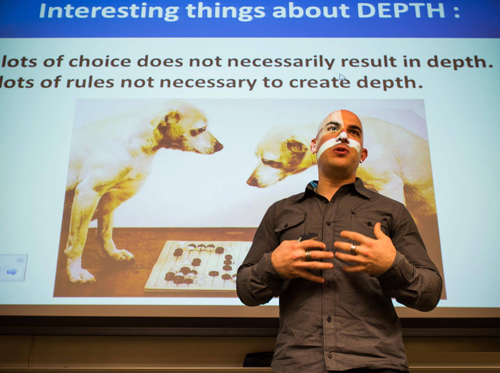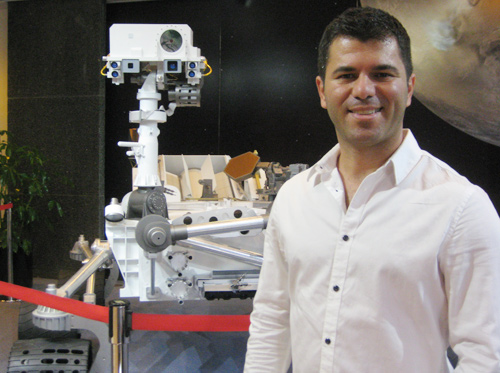-

Ara Shirinian
11:34 | 24.08.15 | Interviews | exclusive 12174
Ara Shirinian: Armenia has significant game development potential
American Armenian Ara Shirinian who is a video games designer visited Yerevan recently. For two weeks, he conducted classes on Unreal Engine platform for Tumo students.
Itel.am had an exclusive interview with Ara Shirinian.
- You also teach in the U.S. Are Armenian and American teenagers equally interested in game development?
- I have conducted lessons for high school pupils in the U.S., and I also have taught game development to first year students at Arizona State University. If we compare American and Armenian high school pupils, at first the overall level of abilities seems to be about the same.
In Yerevan, I have conducted workshops for two groups of 10 teenagers each at Tumo. The workshop duration was 2 weeks - 2 hours a day. Game development is quite demanding of time and effort, so our schedule was very accelerated and I think it’s the minimum time required for learning something meaningful about making games.
It was not apparent to me until the second week of the workshop that there was something different about my Armenian students. They are a little “more hungry”, and they are a little better at planning their own designs and intentions. One must have a certain kind of intense persistence in the face of constant frustration and failure to be successful in the video game industry, and it was wonderful to see a kernel of this in my short workshop. This gives me great hope for the future of video games in Armenia.
I was also surprised by the fact that both the American and Armenian high school students demonstrated much more interest and motivation in the subject than university students. I think this is probably due to a difference of context- the workshop at Tumo and in America that I conducted with high school students were special classes where each student was attending because they personally wanted to be there.
And in American universities, many students are there not because they want to be, but because it is something expected of them. You cannot survive the rigors of game development if you do not have a burning desire for it inside you.
- During your stay in Yerevan, you met a number of gamers. How are your impressions?
- On the day of my open lecture at Tumo, I had the chance to meet Armenian game developers and company representatives.
I don’t know how accurate my understanding is but I’ve been told that most game developers in Armenia make a lot of games that are similar to existing games. But at the same time, I have been impressed by some demos, not for their technological or graphic solutions but for their ideas.
One of the most beautiful things about games to me is that, to develop a good game, it is not necessary to rely upon high technology, even to do something creatively new that no one has ever seen before.
For instance, Tetris used to be one of the most popular games. It did not require the latest technology when it was invented in 1984. It could have been invented in 1979, when the Electronika 60 it was programmed on was released, but it took Alexey Pajitnov's spark of genius to bring it into the world. To me, gameplay ideas and rules are more important in the craft of video games than the latest technology.
I have heard about Shadowmatic which has recently got Apple Design Award. I’m proud of them and hope that it will help make the Armenian gaming market more popular and people abroad will know that Armenians develop games, too.
In Yerevan, I also got acquainted with some virtual reality games developed by X-TECH. I’d like to note that it’s hard to find good virtual reality games: most of them are boring and sometimes senseless. However, for instance X-TECH was able to find a way to make virtual reality fun in a simple and totally novel way.
Although virtual reality is a new technology, it was their creativity of invention that enabled them to make something fun out of it, not the technology itself.
I think in this sense, Armenia has great potential and very interesting ideas. One thing is clear: you don't need a large budget or resources to develop an excellent game. The idea is the most important thing.
- What are the key current issues in the video game development?
- The biggest single issue is called “discoverability” not only for Armenian but the global market.
The competition in the market is very tough. There is an impression that there are more games being produced than there are customers who want to play them.
The biggest challenge for game developers now is how to get everyone in the world to know that your game exists. If you make an incredible game, if no one knows about it, no one will play it or buy it. This is one instance where small companies or startups have a disadvantage against large companies, as the large companies have massive marketing budgets that ensure their products are seen and advertised en masse. And it is not uncommon for large companies to spend twice as much or even more on marketing as they do on development.
But this doesn't mean the situation is impossible if you cannot compete on their level of marketing spending. For instance, Shadowmatic got their well-deserved attention thanks to Apple's design award. This is the way out for the small guys.
Besides, one should think long-term. Yes, it’s important to earn money as video game development is a business but one shouldn’t only focus on short-term goals. Nowadays, almost no one understands the secret of selling games on a consistent, sustainable basis. Most corporations simply devote more resources to products that prove to make money, and cut resources from products that don't make money.
This approach has its own efficiencies, but one problem is that it doesn't account for the quality of the game experience, which is often treated like a black box. If we do not fundamentally understand the psychological experience of playing a game and the players state of mind, mood, and motivation, the craft of video games will never reach its true potential.
- What is the most attractive thing in video games for you?
- I’m most fascinated by the psychological aspect. How does the experience affect your state of mind? Does it invigorate you or frustrate you? Does it make you feel better as a person or worse? There is a profound potential here which is the basis of the public lecture I gave at Tumo: Video games are essentially teachers, and we as designers use the medium of the video game to transmit learning to our players.
When games are at their best, they give players a safe environment in which to be challenged and to overcome challenges. As designers, our grave responsibility is to teach players the skills to overcome challenges posed by the video game, through the video game itself.
Think about the last time when you accomplished anything in life through effort that you didn't think you were capable of. That moment of success sparks your spirit in a special way, because it opens up your own thinking of what you can be capable of. You immediately start to wonder what else you can accomplish. Possibilities that were closed to you are now open. This translates to real life. Video games have the potential to ignite this spark, and give us the courage and motivation to improve ourselves and accomplish more in all of our own real lives.
Narine Daneghyan talked to Ara Shirinian.

17:29 | 24.09.25 | Articles
Jacopo Losso on Cross-Border Investments and Why Armenia Attracts Angels








